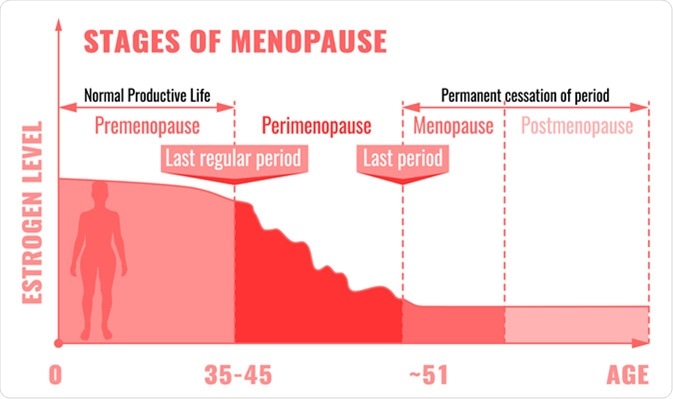
What Should I Eat During Menopause?
Skip to:
- What is menopause?
- Hormonal changes
- Menopause and diet
- Food recommendations for menopausal women
- Dairy products
- Fruits and vegetables
- Fluids
- Whole grains
All women will experience menopause, the end of their reproductive years. During this phase, women experience many body changes, and it’s important to determine what type of diet is appropriate for them at this time in their life.
What is menopause?
Menopause is a natural biological process that occurs in a woman’s life. It marks the permanent end of menstruation and fertility, and for most women occurs once 12 months have passed since the last menstrual period. During menopause, the body produces fewer female hormones - estrogen and progesterone.
Menopause happens in women in their 40s and 50s but may occur at earlier ages as a result of medical procedures that remove the ovaries, cancer treatments like radiation and chemotherapy targeting the pelvic area, and family history of early menopause.

Stages and symptoms of menopause. Image Credit: Double Brain / Shutterstock
The signs and symptoms of menopause can happen years before the last menstrual period in a phase called pre-menopause. Pre-menopause symptoms include irregular menses, hot flashes, chills, vaginal dryness, mood changes, night sweats, sleep pattern problems, dry skin, hair thinning, loss of breast fullness, slowed metabolism, and weight gain.
Hormonal changes
Every woman experiences menopause differently. In some women, they may experience it earlier than others. Also, when they reach their premenopausal and menopausal stages, they may have physical changes that can affect their overall health and well-being.
As women grow older, the ovaries age and hormone production is reduced. As a result, follicle-stimulating hormone and luteinizing hormone may no longer efficiently regulate the levels of progesterone, estrogen, and testosterone. Hence, there is a gradual decrease in estrogen levels in the body during menopause, which can affect health.
Estrogen levels begin to decline during premenopause. As the primary female hormone, estrogen works by promoting the growth of the female reproductive organ, maintaining the vagina’s moisture and elasticity, and helping keep the vagina well supplied with blood. During menopause, due to the decreasing estrogen levels, women may experience vaginal dryness and decreased libido.
Menopause and diet
Obesity is a global health problem that affects all age groups. It is also seen among menopausal women. Because of hormonal changes in the body, menopausal women are more likely to experience weight gain and become overweight or obese. With this increased risk of obesity, comes a higher risk for cardiovascular and metabolic disease. Weight management, therefore, plays a pivotal role in reducing these risks.
Weight management is essential and should involve pharmacological, surgical, and dietary treatment, depending on the patient’s needs.
Health concerns in menopausal women are mainly associated with estrogen deficiency, including vasomotor symptoms, sexual problems, cardiovascular diseases, osteoporosis, estrogen-responsive malignancy, and urogenital atrophy, among others. However, the most significant risks associated with menopause are hypertension and acute myocardial infarction. Along with treating the hormonal changes in menopausal women, it is also important to encourage increased physical activity, consumption of a well-balanced diet, and modification of any detrimental lifestyle practices.
Food recommendations for menopausal women
A well-balanced diet should meet all nutritional requirements in a suitable proportion and amount. Also, some studies recommend these to relieve some symptoms of menopause, such as low bone density, sleep problems, and hot flashes. Here are the food recommendations for menopausal women.
Dairy products
The reduced estrogen levels can increase the risk of osteoporosis and fractures in menopausal women. Incorporating dairy products, which are rich in calcium, vitamins D and K, magnesium, phosphorus, and potassium, can help boost bone health. Recommended dairy products are low-fat milk, cheese, and yogurt. Those who cannot digest dairy should look for foods fortified with calcium (such as orange juice) or those naturally containing calcium (such as almonds).
Fruits and vegetables
As in any diet, eating fruits and vegetables can help promote optimum health. Fruits and vegetables are packed with essential vitamins and minerals, antioxidants, and fiber. According to the American dietary guidelines, about half of the plate should be filled with fruits and vegetables.
For postmenopausal women, cruciferous vegetables may be helpful. For instance, eating broccoli can help decrease a type of estrogen associated with breast cancer, while increasing the type of estrogen that helps protect against the disease.
Menopausal women may also benefit from eating berries, like blackberries and blueberries, to help reduce blood pressure.

Image Credit: Oksana Valiukevic / Shutterstock
Fluids
Drinking water is vital during menopause. Vaginal dryness and dry skin due to low estrogen levels are typical, and drinking adequate amounts of water, about 8 to 10 glasses a day, can help maintain the skin’s moisture. A woman need not obtain all water from drinking, as food, especially plants, contain a large amount of water as well. Furthermore, drinking water reduces bloating due to hormonal changes
Whole grains
Lastly, whole grains are essential during menopause, including barley, quinoa, oatmeal, and brown rice. These food items provide B vitamins to boost energy, promote digestive health, and manage stress
Source:
- Brończyk-Puzoń, A., Piecha, D., and Zubelewicz-Szkodzińska, B. (2015). Guidelines for the dietary management of menopausal women with simple obesity. Menopause Review. https://www.ncbi.nlm.nih.gov/pmc/articles/PMC4440197/#!po=5.55556
- Sapre, S., and Thakur, R. (2014). Lifestyle and dietary factors determine age at natural menopause. Journal of Mid-Life Health. https://www.ncbi.nlm.nih.gov/pmc/articles/PMC3955043/
Further Reading
Last Updated: Mar 10, 2020

































No hay comentarios:
Publicar un comentario